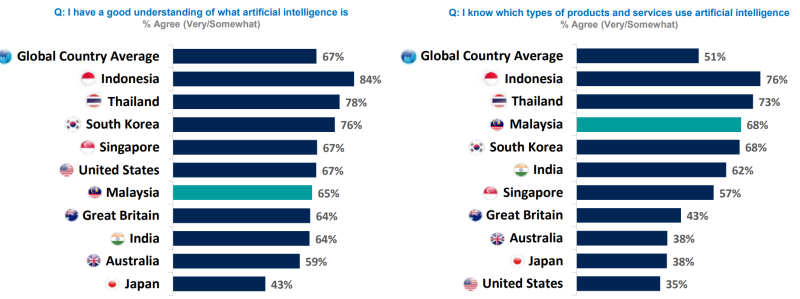share on
This sentiment is more prominent in Singapore and Malaysia, with 67% and 81% expecting AI to change the way they do their job, respectively.
A survey conducted by Ipsos Global studied 22,816 adults under the age of 75 between 26 May and 9 June 2023 from 31 markets.
The report revealed the evolving perceptions and expectations of AI among consumers worldwide, highlighting both anticipation and concerns about its potential impact on various aspects of life.
With regards to impact on working life, Thailand (69%), Malaysia (62%), Indonesia (62%), and India (51%) were most concerned about AI replacing their current job. On average, 57% of workers globally expect AI to change the way they perform in their current jobs, and 36% expect it to replace their current job.
Among the workers surveyed, the percentage of those of expecting each type of disruption is highest in Southeast Asia and lowest in Northern Europe (with differences of up to 50 points) and are also much higher among those who are younger and/or decision makers than among those who are not.
In Singapore, people agree that AI will enable them to have more time to complete tasks (64%) and improve their entertainment options (57%). However, 67% expect AI to change the way they do their jobs, and 41% expect it to replace their current jobs in the next five years. This statistic is significantly higher than the global average.
This trend was also observed in Malaysia, where 81% said that AI would change the way the perform at work, and 62% expect it to take over their jobs.
Asian countries also ranked the highest when asked whether AI products and services had profoundly changed their daily lives. In particular, South Korea ranked the highest globally at 73%, followed by Thailand and Indonesia, both at 72% and Malaysia at 71%.
Lack of understanding about AI
Despite the progression and use of AI applications, the percentage of adults who are aware of the use of AI in products and services remain relatively unchanged. Another constant trend is the divide between generally AI-enthusiastic emerging markets and AI-wary high-income countries.
Across the 31 markets surveyed, two in three (67%) state that they have a good understanding of what AI is, but only half (51%) say they know which products and services use AI. This knowledge of use of AI in products and services is higher among younger adults, men, those who are employed, more educated, and/or more affluent.
However, respondents in Singapore and Malaysia seem to have greater awareness of AI with 57% of Singaporeans and 68% of Malaysians saying they are aware of the types of products and services that use AI, higher than the global average.
Notably, 64% of Singaporeans also believe that AI-based products and services have more benefits than drawbacks. This sentiment is shared by other Asian countries, with an average of 62% of respondents in the Asia Pacific region expressing a positive view of AI.

Feelings towards AI evolution
Overall, only about half of respondents agree that AI-based services have more benefits than drawbacks (54%) and are excited about them (also 54%). However, a similar portion (52%) are nervous about AI-based products and services. Data from the report suggests that the global public is increasingly concerned about being negatively impacted by AI technology as it evolves.
Zooming in, among Asian markets, respondents surveyed are most nervous about the impact of AI on products and services, with nearly as many adults saying that products and services that use AI make them nervous (52%) as say they are excited about them (54%).
More specifically, people in India (58%), Thailand (57%), and Malaysia (55%) were the most nervous.
Overall, only one in three or slightly more say it will improve their health, their job, and their country's economy globally. More say that AI disruption is more likely to hurt the job market, than improve it.
Lead image / Shutterstock
share on


